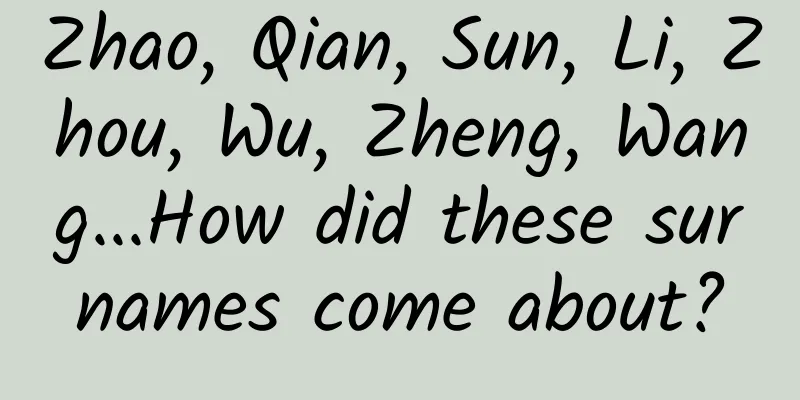Zhao, Qian, Sun, Li, Zhou, Wu, Zheng, Wang...How did these surnames come about?

|
Who am I? Where do I come from? Leaving aside the scope of biology and philosophy, this may be a question about ancestors. We are all descendants of Yan and Huang, there is no doubt about that, but now we are not all surnamed Ji or Jiang, but have different surnames. My surname is Wang, your surname is Li, and his surname is Zhang. Therefore, the clues to tracing our ancestors are transferred to our respective surnames. I opened the family tree and read the records inside. I learned the origin of my ancestors and family. During the Hongwu period, Emperor Zhu Yuanzhang of the Ming Dynasty sent generals to guard the southwestern border. My ancestors moved from Nanjing with their families and eventually settled in my hometown of Dali, Yunnan, where they had many children. This is the answer given to me by the family tree. So when did my ancestors go to Nanjing? My surname is Wang. Is the origin of Wang in Nanjing? Speaking of this, I believe everyone has similar questions about their surnames. To trace the origin, we must start with our surname culture. 1. Origin of the surname Chinese surnames are an ancient cultural form, which sprouted from the totem worship of primitive society, rooted in the clan reproduction at the dawn of civilization, developed in the feudal system of the Xia, Shang and Zhou dynasties, was established in the unified Qin and Han empires, evolved in the ethnic integration of "Hu-Han mutualization", and merged into a multi-integrated cultural system. my country is the first country in the world to use surnames. From the emergence of ancient Chinese surnames in the matriarchal society, it has a history of about 10,000 years. In contrast, most surnames in European and American countries originated in the Middle Ages (late 5th century AD to mid-15th century AD). At the beginning, we mentioned why we don’t all have the surname Ji or Jiang. This has to start with our ancestors Yan and Huang. In the historical documents about the origin of the Yan and Huang tribes, it is said that Emperor Yan Shennong’s mother was Andeng, who gave birth to Emperor Yan by the Jiang River. Therefore, Emperor Yan Shennong took Jiang as his surname. Emperor Huang Xuanyuan’s mother was Fubao, who gave birth to Emperor Huang at the Xuanyuan Hill and raised him by the Ji River, so he took Ji as his surname. In ancient times, primitive totem worship was the fundamental reason for the origin of ancient Chinese surnames. The original meaning of "surname" is a symbolic mark shared by clans with the same female surname ancestor and a common blood relationship. In the matriarchal clan period, blood lineage can only be calculated according to the maternal line, so most ancient Chinese surnames are derived from the mother's surname. The original meaning of the surname emphasizes the concept of fertility, so most ancient Chinese surnames that have been passed down to this day have the female radical. For example, the so-called "eight ancient surnames" Jiang, Ji, Gui, Si, Ying, Ji, Yao, and Xun all have the female radical. Now we talk about surnames together, but in the early days of surnames, the surnames of our ancestors were separate , such as Taihao Fuxi who "distinguished marriages and rectified surnames", Yan Emperor Shennong who "tasted hundreds of herbs and cultivated the five grains", Huangdi Xuanyuan who "clarified human relations and established criminal laws", Shaohao Jintian who "managed the calendar and distinguished the four seasons", and other ancient emperors (chiefs of tribal alliances), as well as the "Youyu" who was in charge of mountains, forests, rivers and lakes, the "Youtao" who was responsible for pottery making, the Zhurong and Chongli who were in charge of "fire", and the The hundreds of officials such as the "Dali" of criminal law are distinguished by their surnames. The earliest cultural ancestor of the Chinese nation, Taihao Fuxi, has his surname Feng as its origin, and his clan name is Fuxi; the Yellow Emperor has his surname Ji as its origin, and his clan name is Xuanyuan; the Yan Emperor Shennong has his surname Jiang as its origin, and his clan name is Shennong; the Emperor Yao's surname is Yao, and his clan name is Yi Qi; Shun's surname is Gui, and his clan name is You Yu; Dayu's surname is Si, and his clan name is You Xia; the Shang Dynasty took Zi as its surname and Shang as its clan name; the Zhou Dynasty took Ji as its surname and Zhou as its clan name. This "surname dual track" system, in which "surname" and "clan name" coexisted, lasted through the Xia, Shang, and Western Zhou dynasties, and continued until the end of the Spring and Autumn Period without any changes . By the end of the Spring and Autumn Period, during the Warring States Period, due to the rapid social turmoil, "rituals and music collapsed, and society was in disorder", the social foundation on which the "surname dual track" system relied for its survival gradually disintegrated. During the Qin and Han dynasties, the system developed from "separate surnames" to "surname unity" , which is what we call surnames today. The development from "surname dual track" to "surname unity" is an important development and evolution process in the history of Chinese surnames. The common use of surnames is a major turning point and evolution in the history of surname development. After the Qin and Han Dynasties, surnames were not distinguished and were mixed together. Some people said surnames, some said clan names, or both "surnames" and "clan names". The result of this "surname-clan integration" is that the "clan name" originally used to distinguish between noble and humble is completely integrated into the original surname, which greatly enriches and expands the number and connotation of surnames, forming the basic form of today's surnames. The surname system is basically finalized. Although there have been developments and changes in successive dynasties, they have basically maintained the model of "surname-clan integration". From then on, there was no longer any distinction between surnames. From emperors to ordinary people, everyone enjoyed the right to a surname. Every clan had its own fixed surname, which was continued to be used by their descendants and passed down to this day. 2. The Development of Surnames 1. Records of surnames In order to distinguish the different historical stages and cultural connotations of surname development in the pre-Qin period and since the Qin and Han dynasties, we collectively refer to the pre-Qin surnames as "ancient surnames" and the surnames since the Qin and Han dynasties as "modern surnames". The enlightenment of Chinese culture and surnames in ancient times came from the Three Hundred Thousands, namely "Three Character Classic", "Hundred Family Surnames", and "Thousand Character Classic". In the recitation of Zhao, Qian, Sun, Li, Zhou, Wu, Zheng, Wang..., we learned characters and surnames. The Song Dynasty version of "Hundred Family Surnames" that has been handed down to this day includes 440 surnames. The number increased to 504 in the Qing Dynasty version of "Enlarged Hundred Family Surnames". There is no consensus on who wrote "Hundred Family Surnames" and when it was completed. The more consistent view in the academic community is that the book had a base copy before the Song Dynasty and was edited and processed by an old Confucian scholar in the Wuyue region in the early Northern Song Dynasty. At the same time, the first sentence of the book, "Zhao, Qian, Sun, and Li", is analyzed because "Zhao" is the surname of the Song Dynasty, "Qian" is the surname of Wuyue King Qian Liu, "Sun" is the surname of Wuyue Queen, and "Li" is taken from the surname of the Li family of the Southern Tang Dynasty. The book includes 440 surnames. The most popular one in modern times is the "Zengguang Baijiaxing" from the Qing Dynasty, which contains a total of 504 surnames, including 444 single surnames and 60 double surnames, which generally includes the surnames commonly used in daily life and has great practical value. "Zhonghua Xingshi Dadian" is a traditional large-scale surname dictionary, which contains more than 7,000 surnames from ancient times to now, arranged according to the traditional radical strokes (there is a phonetic sequence search in the appendix at the end of the book), first single surnames, then double surnames. The entry explanation includes three parts: "main information", "supplementary information" and "notes". "Main information" extracts and compiles the main surname literature materials since the Tang and Song Dynasties, either quoting the full text or excerpting, so that readers can appreciate the essence of the original text and original works, and chew and taste them for themselves. 2. Number and geographical distribution of surnames As a great country with hundreds of millions of people, our surnames are not limited to the common surnames listed in the Hundred Family Surnames. The more authoritative statement about the number of surnames is that Du Ruofu and Yuan Yida, researchers at the Institute of Genetics of the Chinese Academy of Sciences, conducted statistical research based on the data of the fourth national census and the book "Surname Distribution of the Population in Taiwan" published in 1970 in Taiwan, China . In the "Chinese Surname Dictionary", it is determined that there are as many as 11,969 surnames in the Chinese nation, including 5,327 single-character surnames, 4,329 double-character surnames, and 2,313 surnames with more than three characters. There are more than 3,000 Chinese surnames still in common use. According to the "2019 National Name Report" released by the Household Registration Management Research Center of the Ministry of Public Security, among the top 100 surnames in 2019, ranked by the number of registered population, Wang, Li, Zhang, Liu, and Chen ranked in the top five, followed by Yang, Huang, Zhao, Wu, Zhou, Xu, Sun, Ma, Zhu, Hu, Guo, He, Lin, Gao, Luo, Zheng, Liang, Xie, Song, Tang, Xu, Deng, Han, Feng, Cao, Peng, Zeng, Xiao, and Tian. The total number of the first 100 surnames accounts for 85.9% of the national registered population. The surname population distribution in each province (region, municipality) is not the same. Wang is the most common surname in China, and it is also the most common surname in 16 provinces (regions, municipalities), including Beijing, Tianjin, Hebei, Shanxi, Inner Mongolia, Liaoning, Jilin, Heilongjiang, Jiangsu, Anhui, Shandong, Henan, Hainan, Shaanxi, Gansu, and Xinjiang. Li is the most common surname in Hubei, Hunan, Chongqing, Sichuan, and Yunnan. Zhang is the most common surname in Shanghai. Liu is the most common surname in Jiangxi. Chen is the most common surname in Zhejiang, Fujian, and Guangdong. Yang is the most common surname in Guizhou. Huang is the most common surname in Guangxi. Ma is the most common surname in Qinghai and Ningxia. The Tibetan population in the Tibet Autonomous Region accounts for about 94.3%. When registering their household registration, most of them only register their names, so no statistical analysis has been conducted on the surnames of the population in the Tibet Autonomous Region. Although Taiwan, the treasure island of the motherland, has long been separated from overseas, most of the local residents are descendants of immigrants from Fujian and Guangdong provinces. Among the more than 23 million people, the Han nationality accounts for more than 99%. The surnames of the population are arranged in the following order: Chen, Lin, Huang, Zhang, Li, Wang, Wu, Liu, Cai, Yang, Xu, Zheng, Xie, Gao, Hong, Qiu, Zeng, Liao, Lai, Xu, Zhou, Ye, Su, Zhuang, etc. They reflect the historical origins and cultural complexes of the same origin and roots as the mainland of the motherland. From this it can be seen that when traveling across the country, as introduced at the beginning of the article, if my surname is Wang, your surname is Li, and his surname is Zhang, there will be a high degree of similarity. After all, Wang, Zhang, and Li are indeed common surnames in our country. 3. Naming and classification of surnames In the Western Zhou Dynasty, under the Zhou Dynasty's patriarchal system, the emperor had the highest rank and could use the title of his dynasty as his surname. For example, the Zhou emperor and his direct descendants took Zhou as their surname; the vassal states took their fiefdoms as their surnames, such as Jin, Lu, Qi, Yan, Zheng, Wu, etc.; the ministers took their fiefdoms as their surnames, such as Yuan, Xue, Yang, etc.; professional technicians who served the royal family took "ji" as their surname, such as Che, Tu, Tao, etc. Later, with the change of dynasties and the progress of history, surnames continued to develop and expand. With the development of surnames, classifying and counting surnames has become a basic method for understanding the population and its distribution. It is difficult to trace when the taxonomy of surnames in China began. Judging from the existing literature and books, the earliest relevant records are in the Han Dynasty Ying Shao's "Fengsu Tong·Surname Chapter" and Wang Fu's "Qianfu Lun·Records of Surnames", which included hundreds of surnames at that time and classified them according to their origins, but they were too brief. Over the past thousand years, "Tongzhi·Clans" has drawn on the research results of predecessors and collected the opinions of many schools, and listed the categories of surnames into 32 categories: "surnames based on the country, surnames based on the county, surnames based on the town, surnames based on the township, surnames based on the pavilion, etc." "Categories: surnames based on place, surname, character, given name, order, clan, official position, rank, bad virtue, good virtue, skill, deeds, posthumous title, rank, country, clan, name, country rank, town, official name, town posthumous title, posthumous title, Daibei double surname, Guanxi double surname, various double surnames, Daibei three-character surnames." Let's take a look at some examples below: ① Using the clan name of the ancestors as the surname, such as Tang, Yu, Xia, and Yin. ② Use the bestowed title as a surname, such as Wang, Gong, Hou, and Bo. ③ Use the place of residence as the surname, such as Cheng, Guo, Yuan, and Chi. ④ Use the posthumous title of a noble as a surname, such as Wen, Wu, Zhuang, and Mu. ⑤ Use the official title held as the surname, such as Sima, Sikong, and Situ. ⑥ Use the name of the feudal country as the surname, such as Qi, Lu, Song, and Wei. ⑦ Surnames derived from special events or allusions, such as Che, Dou, Bai Ma, Qing Niu. ⑧The surname is based on the order of brothers and relatives, such as Bo, Zhong, Shu, and Ji. ⑨Use the title of a job title as a surname, such as Sanniao (doctor) and Wulu (doctor). 4. Surname mobility In the course of Chinese history, the migration of population has led to the mobility of surnames, and various surnames are scattered all over the country, so people with the same surname may not necessarily have the same origin and clan . For example, the surname Wang includes kings with the "Ji surname" (royal family of the Zhou Dynasty), such as "Wang of Taiyuan"; kings with the "Zi surname", such as "Wang of Ji County" (descendants of Bigan of the Shang Dynasty); kings with the "Gui surname" (descendants of Emperor Shun); kings with the "Lu surname"; and some princes and sons of the kings who changed their surnames to Wang after the fall of their country. Because there are many surnames, the Wang family has a large population and has become a major surname in China. The migration of aristocratic families to the south has occurred in all dynasties, but the migrations that were larger in scale, involved more people, lasted longer, and had greater impact on later generations were: the first at the end of the Western Jin Dynasty, the second at the end of the Tang Dynasty and the Five Dynasties, and the third when the Song Dynasty moved south. In order to avoid war, the population migrated, and the surnames were also scattered to various places. In order to maintain their rule and defend the border, dynasties or separatist regimes in history often mobilized a large number of soldiers and civilians to garrison the border or immigrate to settle and cultivate the land . For example, in the Qin Dynasty, they garrisoned the Great Wall and Lingnan and immigrated to Bashu; in the Han Dynasty, they garrisoned the Western Regions to monitor the Xiongnu; in the Tang Dynasty, they entered Fujian and opened Zhangzhou to pacify Nanzhao; in the Ming Dynasty, they garrisoned Yunnan and stationed in Liaodong. There were a large number of soldiers and soldiers stationed in the border areas for a long time. Some of them followed their families with the army, and some married and had children in the local area, and passed down from generation to generation, living in a foreign land. For example, Mu Ying of the Ming Dynasty was ordered to march south and led his troops into Yunnan. He inherited the title of king and became a wealthy family in Yunnan. The Qiqing Li family of Tengchong also followed Mu Ying into Yunnan, lived there for generations, and became a large family. What is particularly special is that when emperors of successive dynasties built imperial mausoleums, they often recruited a large number of soldiers and civilians as "mausoleum households". Over time, the family multiplied and gradually became a town. Emperor Gaozu of the Han Dynasty moved the descendants of the six kingdoms and the wealthy families to Changling , Emperor Wu of the Han Dynasty moved the rich and powerful families of the prefectures and states and the famous families with assets of more than 2 million to Maoling, and Emperor Zhao of the Han Dynasty recruited soldiers and moved people to Yunling. In addition, the Qianling Mausoleum of the Tang Dynasty, the Xiaoling Mausoleum of the Ming Dynasty, and the Eastern Mausoleum of the Qing Dynasty all recruited and moved different numbers of soldiers and civilians to guard the mausoleums. These soldiers and civilians who were moved or recruited often kept their posts for generations and lived together as a clan, which is a major feature of the migration history of Chinese surnames. Another special surname flow is the bestowal of surnames , which began in the Han Dynasty. In order to commend the achievements of Lou Jing and Xiang Bo, Emperor Gaozu of the Han Dynasty, Liu Bang, bestowed the surname Liu on Lou and Xiang. In the Tang Dynasty, as many as 16 tribes were given the surname "Li" to meritorious ministers and foreign tribes who surrendered. Zhu Yuanzhang, the first emperor of the Ming Dynasty, also bestowed the surname Zhu on his nephew Li Wenzhong, adopted son Mu Ying, and He Wenhui. The Longwu Emperor of the Southern Ming Dynasty also bestowed the surname "Zhu" on Zheng Chenggong, who was called "Guo Xing Ye" to show his honor and favor. The emperor bestowed surnames on his subjects, not all of which were praise and favor; for political enemies and traitors, he also bestowed dangerous surnames as punishment . For example, after Wu Zetian became emperor, she forced the Queen Wang of the Tang Dynasty to change her surname to "Mang", and gave the surname Kui to the Li kings who rose up against her. 3. Family, Country and the World in Surnames The remembrance and remembering of ancestors is the cultural foundation of the Chinese nation. Surnames connect our ancestors and us, and us and our families. Through our surnames, we can see the continuation of our families. The Zhou surname has Hou Ji as its ancestor, the Wu surname has Taibo as its ancestor, the Jiang surname has Jiang Shang as its ancestor, the Wang surname has Wang Zijiao (Prince Jin) as its ancestor, the Chen surname has Chen Hugong as its ancestor, the Lin surname has Bigan as its ancestor, the Li surname has Gao Yao as its ancestor... From our ancestors to us, across thousands of years, they have become our family, our country, and the world . "When you eat a bowl of porridge or a meal, you should think about how hard it is to get it. When you use a piece of silk or a piece of cloth, you should always remember how hard it is to make material resources." This was proposed by Zhu family in Kunshan, and later became a common motto for people to be diligent and thrifty. If the "door list" book is "Three Remaining Doors", it belongs to the Dong family. It comes from Dong Yu, a Wei man during the Three Kingdoms period, because he often taught his children to use the "three remaining" time to read. "Three Remaining" means "winter is the remaining time of the year, night is the remaining time of the day, and cloudy and rainy days are the remaining time of the year." In layman's terms, night, rainy days, and winter are all good times to read. "Hongnong Shize" and "Qinbai Chuanjia" are the door plaques and hall plaques of the Yang family. The allusions come from Yang Zhen, the Taiwei of the Eastern Han Dynasty. Yang Zhen lived in Hongnong, Shaanxi, and was an upright official all his life. During the Warring States Period, there was Su Qin from Luoyang. He hung his head on the beam and pierced his thigh with a needle. He studied hard and finally learned the art of diplomacy and wore the seals of six countries. During the Western Han Dynasty, there was Su Wu, who was sent as an envoy to the Xiongnu with a special envoy. He was detained in the bitter cold land of the North Sea and herded sheep for 19 years with the Han envoy. The Xiongnu tried to persuade him to surrender many times, but he refused sternly and remained loyal. Later generations then wrote a couplet based on the stories of Su Qin and Su Wu to inspire future generations: pricking his thigh with a needle, being loyal with a special envoy. Zhou Dunyi of the Northern Song Dynasty loved the lotus because it grew out of the mud but remained unstained. In the Han Dynasty, there was a famous general named Zhou Yafu, the son of Grand Commandant Zhou Bo, who led his troops to garrison Xiliu. Emperor Wen of the Han Dynasty personally went to inspect the place, but the soldiers guarding the gate did not dare to open the camp to welcome the emperor without the order of General Yafu. He was known for his strict military discipline. Zhou's descendants wrote a couplet based on the story of these two famous people, one civil and one military, and were proud of it: The love of lotus is the family heritage, and the reputation of Xiliu is the family reputation. Let’s look at the inscription on another Wang Family Ancestral Hall: “Since the Wang family received the surname from Prince Jin (Wang Zijiao) of King Ling of Zhou, the basic lineage from Taiyuan King to Yuancheng King, Sanhuai King, and Tongling King has been passed down through the Han, Three Kingdoms, Tang, and Song dynasties, as well as the Xicun Wang family’s branch factions, eight-part ancestral hall, prosperous descendants, and clean family background: Since receiving the surname in the Eastern Zhou Dynasty, the family has achieved fame and honors of the Five Marquises and Three Dukes, and has been ranked among the Seven Sages and Four Heroes in terms of talent and learning. There have been heroes in every generation, and the ancestors’ virtues can be traced back to the source, and the sacrificial offerings are fragrant, as cool as autumn frost and spring dew; After settling in Xicun, the branches have been divided into thousands of streams and factions, and the clan has united into eight-part ancestral halls. The family has flourished, the family has continued, the descendants have prospered, the family has been clean, and the family has been prosperous.” In addition, such as Zhang's "Qinghe Family Heritage", Li's "Fengming Family Heritage", Liu's "Pengcheng Family Tree", Niu's "Five Classics Family Heritage", Lu's "Fanyang Famous Family", Dong's "Jiangxia Family Heritage", Deng's "Nanyang Family Heritage", Wu's "Yanling Family Heritage", Zheng's "Xingyang Family", Guo's "Fenyang Family Heritage", Cai's "Rulin Family Heritage", Fan's "Wenzheng Family Reputation"... are all special door lists and plaques for a certain surname. Through these door lists and plaques, one can still feel the pride in ancestors and the expectations for family descendants. Now that we know the origin and evolution of our surname, let’s quickly ask the elders in our family, and trace back the footsteps of our ancestors through the inheritance of the family surname. Perhaps we were neighbors thousands of years ago. Reference book ----- "Chinese Surname Culture" by Li Ji |
<<: Farewell forever! The space "Line Walker" Voyager 1 lost contact, where will it go in the end?
Recommend
Smart TV: Don’t let intelligence become a “burden”
Smart TVs have gradually become the mainstream in...
Can hawthorn and chestnut be eaten together? What will happen if you eat them?
Review expert: Wang Xuejiang, professor of pathop...
Mr. J · Video account unmanned live broadcast sales, you can do it with WeChat, you can do it in batches
Mr. J · Video account unmanned live broadcast sal...
Why do wind turbines have to have three blades? This is related to the efficiency of wind energy conversion
Old-style electric fans are composed of three bla...
How much does it cost to join a gardening mini program in Yangzhou?
How much does it cost to join a gardening mini pr...
During the epidemic, how can brands effectively implement grass-roots marketing?
During the epidemic, all walks of life were inevi...
The all-new Touareg will debut next year, lighter, bigger and more luxurious
Recently, the third-generation Touareg, which has...
Are young people nowadays even starting to "pre-make" their Moments? Go out for fun once, and post it on Moments for five years?
Recently, the topic of "pre-made circle of f...
2 tips to double your conversion rate! Which one have you used?
In previous articles, Qingguajun has always empha...
Why are there only No. 1, 5, and 7 batteries, but no No. 4, 8, 9, and 10?
Audit expert: Wang Jinlu Shenzhen Lingkang Techno...
How to win at mahjong? Remember these postures and tricks, a must-have for winning during the Spring Festival
It is said that Sichuan people love playing mahjo...
What! More than half of the world’s macadamia nuts come from Yunnan?
When it comes to Yunnan nuts, you may be confused...
1 child fell into the water and relatives tried to rescue him, resulting in 6 people drowning! You must master these self-rescue tips
According to CCTV News, at around 2 p.m. on July ...
LeTV Super TV never relies on marketing to win, do you believe it?
LeTV, which just announced a sales target of 3 bi...
I advise you to eat more! Freshwater fish are no worse than marine fish in these two nutrients!
It is often mistaken that only marine fish contai...


![[Case] How can live streaming products quickly acquire high-quality iOS users?](/upload/images/67cc3eb47dcbc.webp)






